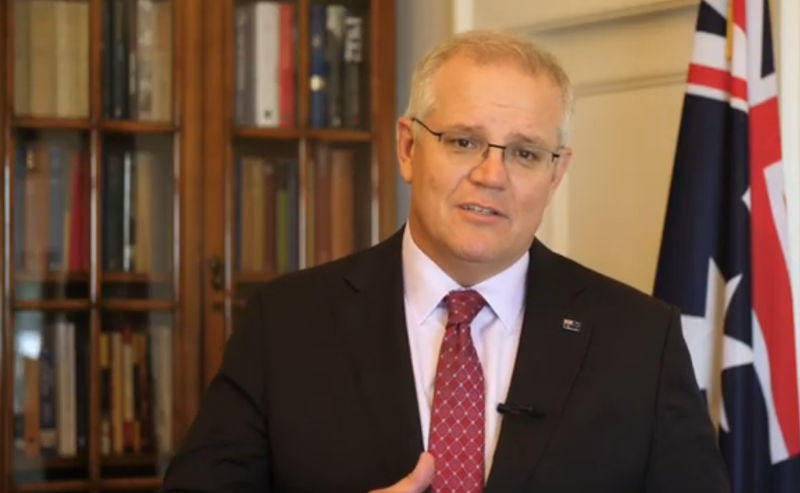War mongering through the Scott Morrison lens
October 20, 2023
The former Australian Prime Minister Scott Morrison continues to maintain his role as the countrys noisiest anti-Beijing figure. Still a federal member of the New South Wales seat of Cook (when will sod and off make union regarding him?), he is showing electors, each and every day, why his resignation is in order.
Those bothering to listen to Morrison must ask the vital question: What on earth does this failed advertising executive buffoon have to offer on the stretchy, muddy patch of thought known as geopolitics? The short answer: platitudes. And he gets paid for them.
The former Australian prime minister, immigration minister, and machete wielder has joined, in a scratching, dull way, the right clubs with their appropriately spiked drinks the Hudson Institute, for instance, where a sharp, semi-literate flavour counts for expert insight and profundity.
He has participated in securing clubbable security arrangements, AUKUS being the most noxious fruit of that endeavour. Along the way, he managed to imperil Australian export industries to China because of a quixotic attempt to seek an independent (read Washington-directed) inquiry into the Chinese origins of COVID-19. The World Health Organisation simply would not do, being an international organisation and therefore unreliable.
At the recent Yushan Forum in Taipei, Morrison merely confirmedthat what he says for payment for his abundant cultural and political ignorance of China is this: that the West must confront, aggressively, the authoritarian ambitions of the Oriental Satan. War over Taiwan is imminent, and preparations must be made for that eventuality. The result, at least when it comes to Australia-China relations, is one of the worlds more dysfunctional relationships: hot on iron ore, coal and any assortment of commodities; cold and childish on the political system of the destination country who so happens to be paying the bills.
In his Yushan Forum speech, Morrison revealed how, as prime minister, he obsessed about the China threat. When my government took the decision for Australia to swiftly provide lethal aid to support and assist Ukraine following the illegal invasion by Russia, that decision was taken with as much of having Beijing in mind as Moscow.
Ukraine played the role as a convenient surrogate and bright beacon for advancing an anti-China policy. We did it to certainly support Ukraine in their time of need and to defend democracy there, but we also did it to demonstrate our alignment with a global Western resolve to resist the aggression of authoritarianism, especially given the tacit endorsement of that invasion by Beijing.
This is the attitude of a war-mad fantasist who conflates irrelevant variables. Russia and China are seen as indistinguishable, allied powers with mirrored policies, an assumption as inaccurate as the Cold War thesis that Mao Zedongs foreign policy was directed by the politburo in Moscow. It follows, therefore, that Moscows ambitions regarding Ukrainian territory should be seen alongside Beijings desire to acquire Taiwan. In Morrisons apples and oranges comparison, Legitimately in the region one can ask: if Taiwan, then what and who is next?
Morrisons tatty world view has its followers. Rory Medcalf, who continues to have pretensions of being a geopolitical analyst, has also been incessant about the broader lessons linking Russian conduct in Ukraine to Chinese ambitions in the Indo-Pacific. In a 2022 piece run in the German 49 Security Forum, the head of the ANUs National Security College encourages Europeans, and Germany in particular, to look beyond the Euro-centric compass of the Ukraine War. The conflict, he insisted, will develop within a global context, which will be framed by the China-Russia no-limits partnership and the lessons Beijing is learning and will apply for its own purposes of dominance. Australia, he suggested, had shown foresight in supplying military equipment to Ukraine and attending the NATO summit as an Indo-Pacific partner, another signal that we recognize the need for solidarity with democratic partners around the world.
Similar views were also expressedby Medcalfs NSC colleague William Stoltz, who seamlessly stretched the significance of the Russian invasion of Ukraine by linking it to an emboldened Chinese foreign policy. It was necessary that the Australian government send a a strong signal to Beijing, in particular, that Australia and like-minded countries wont tolerate these types of arbitrary annexations.
Such positions have been aped with vigour in Rupert Murdochs News Corp papers. In a July 2022 editorialin The Australian, Prime Minister Anthony Albanese was seen as being on the right side of history and correct to throw Australias lot firmly in with NATO and to recognise the extent to which Chinas no limits pact with Russia has set alarm bells ringing around the world. Both countries had voiced their opposition to the AUKUS alliance between Australia, Britain and the US and Beijing had, with Moscow, called for an end to NATO enlargement and supported its demand for security demands from the West. How terrible of them to have done so.
The Member for Cook remains numbingly unoriginal in a pantheon of unoriginal Australian prime ministers, notably when it comes to foreign policy and committing the country to conflict. The Vietnam war snagged the likes of the vestigial colonial figure of Robert Menzies, addled by fears of a monolithic, yellow-hued communism. The same did it for the ill-fated, sea-destined Harold Holt. Come Iraqs invasion of Kuwait in 1990 and the undoubtedly illegal invasion of Iraq in 2003, we had Bob Hawke and John Howard performing, respectively, the footman duties that Washington had come to expect from their Antipodean charges.
At each and every turn, the Australian agenda is authored by script writers in the United States and delivered to their Canberra outpost, where Washington knows it will be heard and followed. When it comes to confronting China and preparing for the next, disastrous war, US administrations can continue to put their trust in the proselytising, smearing efforts of Scomo.

